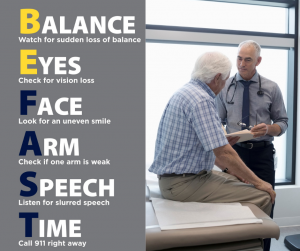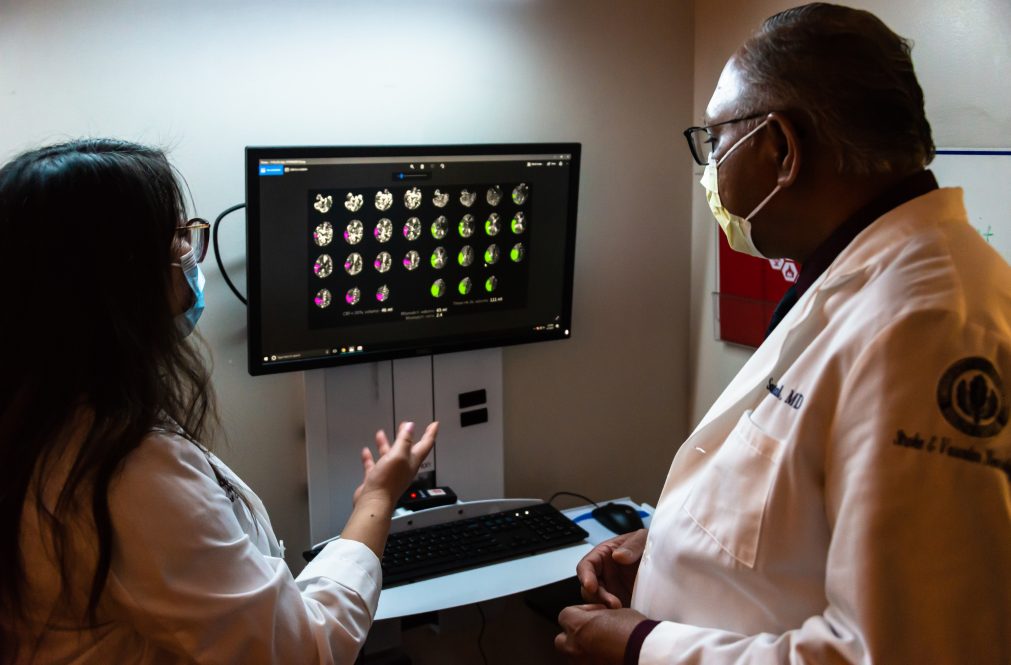May is Stroke Awareness Month and we continue to raise awareness of the signs of stroke and the importance of getting swift care.
Each year, 800,000 Americans experience a stroke, which means a stroke strikes someone in the U.S. every 40 seconds. Stroke also takes the lives of 129,000 people a year, is the fifth leading cause of death in the U.S., and is the number one major cause of adult disability.
It is important to recognize the signs of stroke and be sure that you or a loved one receives care quickly.
A simple way to remember the warning signs of stroke is BE FAST:
 B – BALANCE: Watch for sudden loss of balance
B – BALANCE: Watch for sudden loss of balance
E – EYES: Check for vision loss
F – FACE: Does one side of the face droop or is it numb? Ask the person to smile. Is the person’s smile uneven?
A – ARM: Is one arm weak or numb? Ask the person to raise both arms. Does one arm drift downward?
S – SPEECH: Is speech slurred? Is the person unable to speak or hard to understand? Ask the person to repeat a simple sentence, like “The sky is blue.” Is the sentence repeated correctly?
T – TIME: If someone shows any of these symptoms, even if the symptoms go away, call 9-1-1 and get the person to the hospital immediately. Check the time so you’ll know when the first symptoms appeared.
Additional symptoms of stroke include:
- Numbness or weakness of face arm and/or leg
- Acute Vision Changes
- Difficulty in speaking
- Trouble in understanding simple statements
- Confusion
- Trouble in walking or maintaining balance
- Sudden severe headache
A stroke interrupts blood flow to the brain. Fortunately, there are medications that, when administered quickly, can restore blood flow and start the healing process. Ideally, patients should receive this treatment within a three-hour window. Earlier is always better. More than 90% of patients at UConn Health will get the clot-reducing medication within 60 minutes or less.
The phrase “time is brain” is emphasized by doctors and specialists in the Stroke Center at UConn Health. The time of onset of symptoms to treatment has a powerful impact on outcomes and treatment of a stroke.
“Time is of the essence when it comes to strokes, and improving patient outcomes by providing clot-busting treatment in a timely manner is our goal in every instance,” says Dr. Sanjay Mittal, medical director of the UConn Health Stroke Center.
The neurologists, neuro-interventionalists, anesthesiologists, and neurosurgeons in the hospital’s state-of-the-art hybrid operating room and its operating room staff work quickly to treat strokes and provide the most comprehensive care.
“The management of stroke patients is a multidisciplinary team effort. Immediate treatment is essential because, with every second that goes by, there is potentially less brain tissue that can be saved,” says Ketan Bulsara, professor, and chief, Division of Neurosurgery.
The Stroke Center at UConn Health is received the American Heart Association/American Stroke Association’s Get With The Guidelines®– Stroke Gold Plus Quality Achievement Award for the past four years. This is a recognition of the hospital’s commitment to ensuring stroke patients receive the most appropriate treatment according to nationally recognized, research-based guidelines based on the latest scientific evidence.
The Stroke Center also recently attained the advanced certification by The Joint Commission as an Advanced Thrombectomy-Capable Stroke Center. This certification recognizes that the UConn Health Stroke Center provides the next generation of stroke care and has met The Joint Commission’s high standards in providing stroke care. UConn Health is only the second Advanced Thrombectomy-Capable Stroke Center in Connecticut and the first in the Hartford region.
For more information, visit UConn Health Stroke Center.
Never ignore an emergency such as a stroke or heart attack. TIME IS BRAIN: the sooner you are evaluated and treated, the greater your odds that what could be a major stroke will be less serious, increasing the chances of a successful recovery.
UConn Health practices strict COVID-19 protocols to protect staff and patients based on CDC guidelines and it is safe to come to the emergency room.



